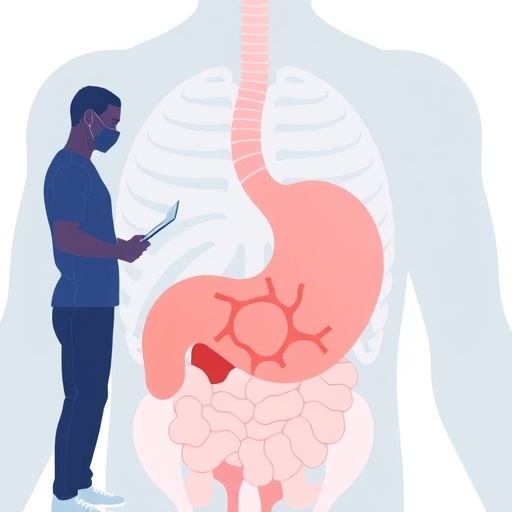In an illuminating study published in BMC Cancer, researchers are uncovering significant insights into the implications of sarcopenia as defined by the Global Leadership Initiative in Sarcopenia (GLIS). This recent investigation focuses on its capability to predict adverse postoperative outcomes in patients who have undergone radical gastrectomy for gastric cancer. With sarcopenia being increasingly recognized as a critical factor that influences recovery and survival rates in surgical patients, the study takes a significant step in solidifying its role as a predictive marker.
The research is grounded in a robust dataset comprising 1,654 patients who were prospectively analyzed after undergoing radical gastrectomy due to gastric cancer. This large cohort allowed for a more comprehensive understanding of how sarcopenia, characterized by low muscle strength, mass, and muscle-specific strength, can affect surgical oncology outcomes. Patients’ clinical data and muscle attributes were meticulously measured, thereby enriching the findings with empirical rigor.
In defining sarcopenia, the GLIS takes a multidimensional approach, focusing not only on muscle mass but integrating muscle strength and muscle-specific strength into the evaluation. Muscle strength was assessed through the grip strength test, while muscle mass was calculated using the skeletal muscle index derived from abdominal computed tomography images. This sophisticated methodology provided an elevated level of precision in diagnosing sarcopenia among the study participants.
Three different criteria for diagnosing sarcopenia were implemented in the study. The first criterion focused solely on low muscle-specific strength, the second on a combination of low muscle strength and mass, and the third on low muscle strength coupled with either low mass or low muscle-specific strength. These diverse criteria were essential to capture the varying manifestations of sarcopenia, thereby allowing for a deeper comprehension of its impact on postoperative outcomes.
The findings of the study revealed that the incidence of sarcopenia, as discerned through the three criteria, ranged from 17.0% to 32.5%, underscoring the prevalence of this condition among individuals undergoing significant surgical procedures. Notably, the first criterion, while revealing a substantial portion of patients who met the sarcopenic definition, did not correlate significantly with severe postoperative complications. This evidence emphasizes the need for a nuanced understanding of how muscle strength interacts with postoperative recovery.
Furthermore, the study examined the link between sarcopenia and various postoperative outcomes, including total complications, overall survival, and disease-free survival. The second criterion showed a significant correlation, but it did not hold in multivariate analyses regarding disease-free survival. This suggests that while certain definitions of sarcopenia may offer insights, they can differ in predictive power depending on the context of the analysis.
Importantly, the third criterion yielded the most compelling results. It demonstrated the largest Youden index and area under the receiver operating characteristic curve, particularly in predicting critical outcomes such as total complications and long-term mortality rates at three and five years post-surgery. This finding positions the third definition of sarcopenia as a potentially invaluable tool for clinicians in assessing postoperative risk levels for gastric cancer patients.
In conclusion, the research elucidated that sarcopenia, especially as defined by low muscle strength coupled with either low muscle mass or low muscle-specific strength, possesses significant predictive value for adverse surgical outcomes. The implications of these findings extend beyond immediate postoperative complications, influencing long-term recovery trajectories and patient survival.
As the medical community continues to navigate the complexities of cancer care and recovery, integrating sarcopenia assessment into preoperative evaluations may well become a pivotal strategy in optimizing surgical outcomes. This study not only sheds light on the importance of muscle health in the surgical oncology sphere but also serves as a clarion call for further research into tailored interventions that could improve postoperative resilience for patients battling gastric cancer.
With a growing body of evidence supporting the need for comprehensive assessments of sarcopenia, healthcare professionals now have a more substantial foundation for identifying at-risk patients. This, in turn, paves the way toward more personalized and effective care strategies that may significantly enhance patient quality of life and outcomes following radical gastrectomy.
In summary, as we delve deeper into the interactions between muscle health and surgical success, the study stands out as a testament to the evolving understanding of risk factors in surgical settings, urging further investigations into how we might better support patients facing such significant medical challenges.
—
Subject of Research: Sarcopenia and postoperative outcomes in gastric cancer surgery.
Article Title: Sarcopenia defined by the global leadership initiative in sarcopenia (GLIS) consensus predicts adverse postoperative outcomes in patients undergoing radical gastrectomy for gastric cancer: analysis from a prospective cohort study.
Article References: Wu, GF., He, CH., Xi, WT. et al. Sarcopenia defined by the global leadership initiative in sarcopenia (GLIS) consensus predicts adverse postoperative outcomes in patients undergoing radical gastrectomy for gastric cancer: analysis from a prospective cohort study.
BMC Cancer 25, 679 (2025). https://doi.org/10.1186/s12885-025-13967-7
Image Credits: Scienmag.com
DOI: https://doi.org/10.1186/s12885-025-13967-7
Keywords: Sarcopenia, gastric cancer, radical gastrectomy, postoperative outcomes, muscle strength, muscle mass, recovery, surgical oncology.




